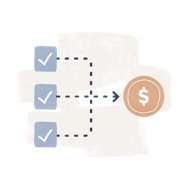Netrepid is a technology company based in Harrisburg, Pennsylvania, that provides hosting and cloud services for mid-tier markets around the world. President and CEO Sam Coyl says he founded the company “by accident,” but has managed to grow Netrepid into one of the largest technology businesses in Central Pennsylvania.
Starting Out
Why did you start your business?
I joined the Marine Corps out of high school to avoid technology. My dad was a computer science major. He was always soldering boards and doing homework on punch cards. It always looked incredibly boring, and I wanted nothing to do with it.
Through a series of odd circumstances, I ended up starting a company doing wireless networking, which was still non-techie in that we were climbing towers and building antennas. That led into clients asking us to configure their switches and configure their service for security. That led into hosting servers, which led into buying a datacenter. And here we are, 20 years later. In my quest to avoid technology, I now own one of the larger technology companies in Central Pennsylvania!
How did you get the funds to get going?
When I first started, it was mainly with credit cards and a second mortgage on my house. We were working out of my home and we had a storage shed at one of the local U-Haul facilities where we’d throw all of our gear. We tried to do it as shoestring as possible to keep things moving without incurring too much debt or expense.
The more we grew, the more we knew we needed more capital and more money. We looked for loans, but at that period in the financial world, nobody was lending to anybody. That made it pretty difficult, but we found private people who were local who were willing to throw in a couple dollars to help us get going. We did more debt rather than giving away equity, because we wanted to try to reserve that as much as possible. We got a mezzanine lender, which gave us a couple hundred thousand dollars to keep things moving.
We’ve tried to be creative about how we’ve raised capital, because it’s been so hard to find. Because we’re a services-based company, we don’t own buildings or large equipment or vehicles. The collateral that a traditional lender is looking for just didn’t exist for us.
Have you heard of business credit?
Yes. The ideal scenario would be to leverage your personal credit to get business credit, whether it’s a corporate credit card or even a $25,000 signature loan, just to get that business credit built up.
As you move your business further along, if you have too much tied to your personal credit, that score starts to decline just because of the exposure. Then, when you try to get a corporate loan later on, it will hurt you there as well. The sooner you can get the corporate credit built up, the better.
I really recommend leveraging your Dun & Bradstreet number the same way you would your personal credit score. Using that as a tool to have creditors report to on a regular basis can be helpful in bolstering that score, which, in turn, helps you generate more credit later on.
Managing the Business
What’s most challenging about running your business?
The biggest challenge is the human element – understanding the relationships, the psychology, the team structures and the different variables with clients and customers. I have no control over when someone calls in sick, or when someone isn’t putting in 100 percent effort, or when a client is a little more demanding than he should be. It’s a challenge to be fluid enough to adapt to those scenarios so you can put the right people in the right places in the right scenarios to be successful.
How do you finance your business to manage cash flow or growth?
We’ve found work where we could trade with some of our vendors and partners. We’ve gotten some of our clients to pre-pay for a year’s worth of services upfront. We really never stop trying to be creative with how to pull things off.
We finally got large enough where we were able to show enough work history and revenue history to work with a local economic group and one of the banks in our area to get an SBA loan, refinance some of our startup capital and lower some of our cash burden. We also have brought in some investors. We’re in the process of closing our first major round of funding right now, which we should finish up next month.
Do you use trade credit from your vendors or suppliers?
We do. Not as much now as when we were first starting, but it’s a necessary tool, especially when you’re first getting started.
What’s the biggest mistake you made early on?
I would say, be very cautious when going into business with friends. Destroying a relationship is avoidable with proper structure and not taking things on a handshake. Document everything, not because you’re paranoid, but just because after six months, you might not remember the intent of a conversation. If you’re going to go into business with friends, do so in such a way that you can mitigate disputes, misunderstandings and conflicts later on, because they are inevitably going to happen.
What’s the smartest thing you did in your first year?
I wasn’t afraid to change. There are so many small businesses that want to do things the same way now and forever. Maybe that worked 50 years ago, but with the advances of technology, applications and the availability of data, if you aren’t constantly willing to reinvent yourself and evolve, someone is going to run you over. We pay constant attention to what’s working and what’s not, what our clients are saying, and what the market is needing.
What’s the most rewarding thing about owning a business?
It’s rewarding when it works – When you hit those strides. The money is nice, but it’s not about the money. When you have a team that’s working, clients that are working, communication that is working and processes that are working – When you see your vision start to come to fruition, that’s what’s rewarding and what, frankly, gets me out of bed in the morning.
Future Plans
What does the future look like for your business?
We are in the process of closing on an acquisition. I’m in a very aggressive growth mode. We’ve had great strides with the team. We’ve got some great investors, people who really believe in us and believe in our business and want us to grow. And we’re in a great position as far as our products and services.
What advice do you have for someone starting a business?
There are too many people who start companies with the perception that cash is just sitting on trees waiting to be plucked with a good idea. The biggest flaw in our economy right now is the perception that you can walk in somewhere with your spreadsheets and projections and get funding. It took me years before I was in a position to be able to do that effectively. It requires a business history, assets and relationships.
If you are going to start a business, be extremely aggressive on how high you think your expenses are – Double or triple them. And cut your projections for revenue in half or by two-thirds. If that still works, then proceed. A lot of first-time entrepreneurs really don’t understand how long it takes to put all the pieces together and win business, deliver business and get paid.
This article was originally written on August 10, 2015 and updated on November 3, 2016.


Have at it! We'd love to hear from you and encourage a lively discussion among our users. Please help us keep our site clean and protect yourself. Refrain from posting overtly promotional content, and avoid disclosing personal information such as bank account or phone numbers.
Reviews Disclosure: The responses below are not provided or commissioned by the credit card, financing and service companies that appear on this site. Responses have not been reviewed, approved or otherwise endorsed by the credit card, financing and service companies and it is not their responsibility to ensure all posts and/or questions are answered.